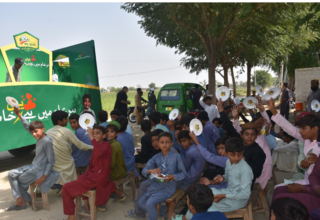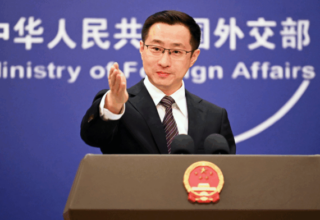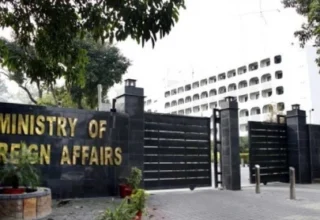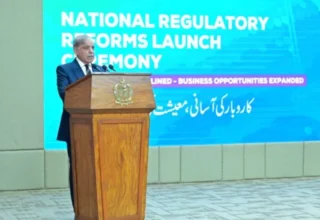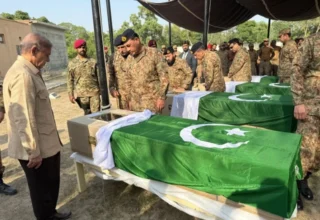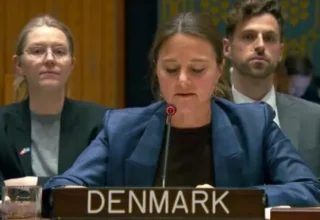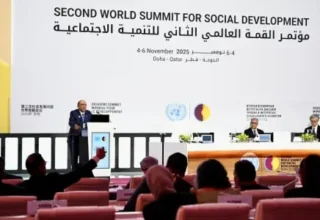
UNITED NATIONS: UN Secretary-General Antonio Guterres has called the coronavirus pandemic the “fight of a generation” and a threat to world peace and security when he addressed the Security Council’s first meeting on the deadly infection, which has swept the globe.
The 15-member Council, which deliberated via a closed video-conference issued a brief press statement expressing “support for all efforts of the secretary-general concerning the potential impact of the COVID-19 pandemic to conflict-affected countries and recalled the need for unity and solidarity with all those affected.”
Guterres, who called for a cease-fire for all global conflicts on March 23, said the crisis has “hindered international, regional and national conflict resolution efforts, exactly when they are needed most.”
The pandemic has so far infected some 1.5 million people – killing 90,000 – in more than 200 countries and territories, according to media reports.
The Council’s session, presided over by Dominican Republic, was held “in connection with the impact of COVID-19 on the issues that fall under the Security Council’s mandate.”
“The pandemic also poses a significant threat to the maintenance of international peace and security – potentially leading to an increase in social unrest and violence that would greatly undermine our ability to fight the disease,” Guterres told the council.
“The engagement of the Security Council will be critical to mitigate the peace and security implications of the COVID-19 pandemic. Indeed, a signal of unity and resolve from the Council would count for a lot at this anxious time,” he said.
Diplomats have largely blamed Security Council inaction over the pandemic on the differences between United States and China.
China’s position has been that dealing with the coronavirus crisis was not within the Security Council’s mandate, while the U.S. has insisted that any Council action refer to the origins of the virus. The new coronavirus, which causes the respiratory illness COVID-19, first emerged in the Chinese city of Wuhan late last year.
Briefing the Council, the secretary-general cited risks to global security from the pandemic: militants seeing an opportunity to strike, potentially with a biological attack, the erosion of trust in public institutions, economic instability, political tensions from postponing elections, uncertainty sparking further division and turmoil in some countries, and COVID-19 “triggering or exacerbating various human rights challenges.”
He reiterated that the United Nations faces “its gravest test” since the organization was founded 75 years ago from the pandemic .
Apart from the differences between the US and China, another reason for the delay in holding the meeting was French President Emmanuel Macron and President Donald Trump’s agreement to organize a video conference of leaders of the five permanent council members, also including China, Russia and Britain. France wanted that summit before a council meeting, but it couldn’t be arranged, the diplomats said.
Meanwhile, the 10 elected members had been pressing for a council meeting and briefing from Guterres — and they had the nine votes needed for it to finally happen on Thursday.
Belgian Ambassador Mar Pecsteen de Buytswerve said even though the press statement from the council was “very minimal” it is an expression of support for the secretary-general and his call for peace and a cease-fire “and that’s the most important thing at this stage.”
Russia’s U.N. Ambassador Vassily Nebenzia said the fight against COVID-19 is “warfare — warfare against an invisible enemy.”
“To win against it and to overcome its consequences we need also to overcome our prejudices, phobias, hatreds, distrust, suspicions,” he said. “It’s not the time for contests — who did what and who was more successful than others. It’s not the time for blaming and finger pointing. It’s time to help, to share experiences and to listen to each other and find ways to work together.”
U.S. Ambassador Kelly Craft also stressed that the challenge of COVID-19 “requires global action, international solidarity, and unity of purpose.”
She made no mention of China, but she did implicitly address U.S. concerns about the information it has provided about the coronavirus saying: “The United States reiterates today the need for complete transparency and the timely sharing of public health data and information within the international community.”
“The most effective way to contain this pandemic is through accurate, science-based data collection and analysis of the origins, characteristics, and spread of the virus,” Craft said. “We cannot stress enough how important these methods are.”
China’s U.N. Ambassador Zhang Jun said the pandemic shows “that people of the world live in a global village and have a shared future.”
Although China faces “risks of rebound and imported cases,” he said, it has provided support in various forms to over 100 nations.
Zhang didn’t mention the United States but was clearly referring to the Trump administration when he said: “To overcome this global challenge, solidarity, cooperation, mutual support and assistance is what we need, while beggar-thy-neighbour or scapegoating will lead us nowhere.”
Germany’s U.N. Ambassador Christoph Heusgen, a non-permanent member, was sharply critical of the council’s five permanent members for its “deafening silence” about COVID-19.
He said the Security Council should support the secretary-general, adopt a legally binding resolution, and “make it clear that we are back in business.”

